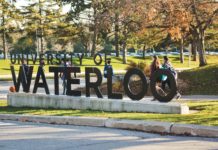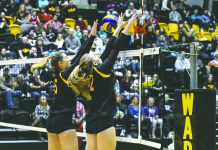On June 20, the Office of the Vice President, Research and International hosted their first Queer Research Panel in honour of pride month. The panel was hosted by lead organizer Benny Skinner and they were joined by Laura Gratton, Lucas Shumaker, Adrian Quijano, and Jayden Bousfield.
The panelists would be asked a variety of questions by Skinner like their research, experiences at UW as queer people, what queerness meant to them, and what they would research if there were no restrictions that limited them.
Skinner is an Indigenous Research Advisor who did their master’s on decolonial policy. They worked on queer reunification with families and have found that queer reunifications receive fewer opportunities than cis-gender heterosexual ones. Skinner was able to instantly find belonging in UW as a queer Indigenous person thanks to the Indigenous student community. After hearing what each person said about what queerness meant to them, Skinner found themselves amazed by the agency each person had regarding their queer identity. They decided that had there not been restrictions around funding and resources, that they would like to do queer brain research.
Quijano is an acting editor for the Community Edition, and he is a UW graduate in English literature. He investigates a lot of trans healthcare in the KW region and found through his interviews that it is often a gamble of if and how long it will take to get the diagnosis of gender dysphoria to receive adequate care. When Quijano was first looking into UW as an option for his post-secondary studies, he noticed the gender-neutral bathrooms, Indigenous queer circles, and queer clubs. Ecstatic about these facilities and opportunities, he chose to attend UW. He joined the drag club during his time here, and discovered his identity as a transgender individual along the way. Upon being asked about what queerness meant to him, Quijano identified an issue with trying to define everything as no one should have to be stuck to one identity and people should pick just what makes them feel most comfortable. Queer Filipino experience research is a topic that Quijano wanted to explore had there not been restrictions.
Bousfield is an undergraduate student studying sexuality, marriage, and family (SMF) and psychology. For her honour’s thesis, Bousfield found that queerness in research often comes up because it provides a perspective for how we look at things. Through her research into gender dysphoria, she found that therapy is not as helpful as community support. As the only queer kid in her high school, Bousfield found herself often alone in navigating and exploring her queer identity. At UW, she joined the rugby team where she found her first exposure to the queer community from her teammates. She was amazed by how people were so proud and comfortable in their identities. Bousfield believed that queerness is about acceptance and peace. She would add that she chose the queer label to be fluid and not be stuck in boxes. Gender research is what interested her most if there was more freedom to do the research she desired.
Gratton is working on her master’s and currently works in the Office of Grants and Research. She also works with intimate partner violence survivors. Her research is about media representation for queer people, with a focus on bisexual representation in the fictional character Harley Quinn. For Gratton, during her undergraduate studies ten years ago, she noticed a lack of queer spaces but found her queer community in her SMF courses. Today, despite completing her studies years ago, the queer community she currently has is made up of mostly former UW graduates. Gratton agreed with Bousfield’s idea of not being stuck in boxes, mentioning a need for self-love and acceptance. The research Gratton would choose to research without restriction is the stories people choose to tell.
Shumaker is a third-year environmental engineering student who works in the WAMPUM Lab. He is looking into the physical impacts of hormone replacement therapy (HRT) and shared that the physical impacts of HRT are not as well-researched as the mental impacts. Shumaker already had a sense of community back in high school, but UW did provide him a space to belong. He is the representative for queer alliance at Conrad Grebel University College. To Shumaker, queerness meant finding himself to be his own muse, feeling freedom in being who he is. As for the research he would choose without restriction, Shumaker confirms that he is already doing the research he wants to do.
A topic that kept coming up throughout the panel was the lack of research into issues that impact queer individuals. First brought up by Skinner, queer research is a topic that has yet to be explored to the depths that non-queer research is. Quijano added that there is no constant average time that it would take for a trans person to get healthcare. In Shumaker’s research, he discussed how doctors are unaware of the many physical effects HRT has, often only covering about 20 per cent of physical effects. The amount of unexplored research is incredibly staggering, this is why the panel is so important as it allows a place for queer researchers to talk about their own research, increasing public awareness. There is a definite need for more panels like this one.































